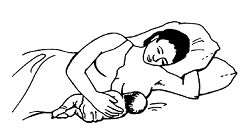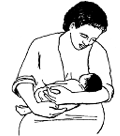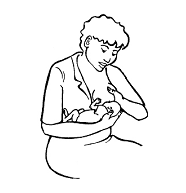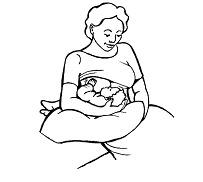Introduction
Getting ready for the birth of your baby is an exciting, yet busy time. Before deciding how you’re to feed your baby, consider breastfeeding because it provides many benefits to your baby and you. To get the full benefits of breastfeeding, you are encourage to breastfeed your baby exclusively until the baby is six months and continue breastfeeding up to 2 years. The meaning of exclusively breastfeeding is not giving any food or drink to your baby, except breastmilk.
The importance of exclusive breastfeeding for the first six months giving no other liquid or foods
- Exclusive breastfeeding provides all the nutrients and water that a baby needs to grow and develop in the first six months. This means to the end of six completed months – 26 weeks or 180 days, not the start of the sixth month.
- Exclusive breastfeeding means that no drinks or foods other than breastmilk are given to a baby. Vitamins, mineral supplements or medicines can be given, if needed. Most exclusively breastfed young infants feed at least eight to twelve times in 24 hours, including night feeds.
- Any of the following will interfere with exclusive breastfeeding:
- A baby is given any drink or food other than breastmilk.
- A baby is given a pacifier/dummy/soother.
- Limits are placed on the number of breastfeeds.
- Limits are placed on suckling time or the length of a breastfeed.
- There are a few points why exclusive breastfeeding is important:
- Reduce infant deaths by reducing diarrhoea and infectious diseases.
- Reduce the risk of respiratory infection for baby.
- Get the right antibodies to protect the baby from illness.
- To develop jaw, teeth and speech development.
Getting started with breastfeeding (Before birth)
- Prepare yourself and family especially your husband with information on breastfeeding. You may need to read books and magazines on breastfeeding or attend antenatal classes together with your husband.
- Get the information from the nearest government hospitals or health clinics, or any breastfeeding support group available, in case you may need help or for any enquiry on breastfeeding.
- It is important for you as a mother to know about breastfeeding as early as possible and to identify any risk of breastfeeding difficulties.
- Get things in order. Arrange for someone else to take over other household chores for the first few weeks after birth. This will help you get enough rest and concentrate on nursing the baby.
The importance of breastfeeding to the baby
- Breastmilk
- Provides ideal nutrition to meet your baby’s needs for growth and development.
- Protects against many infections, and may prevent some infant deaths.
- Reduces risk of allergies and conditions such as juvenile-onset diabetes, in families with a history of these conditions.
- Programmes body systems that may assist in blood pressure regulation and reduction of obesity risk in later life.
- Is readily available, needing no preparation.
- A mother’s own milk is suited to the individual child, changing to meet the baby’s changing needs.
- Children who DO NOT BREASTFEED or receive breastmilk may be at increased risk of:
- Infections such as diarrhoea and gastrointestinal infections, respiratory infections and urinary tract infections.
- Eczema and other atopic conditions.
- Necrotising enterocolitis, in preterm infants.
- Lower developmental performance and educational achievement, thus reducing earning potential.
- Ear Infections.
- Developing juvenile onset insulin dependent diabetes mellitus, higher blood pressure and obesity in childhood, all markers of later heart disease.
- Dying in infancy and early childhood.
- The dangers of not breastfeeding occur with all social and economic circumstances. Many studies indicate that a non-breastfed child living in disease-ridden and unhygienic conditions is between six and 25 times more likely to die of diarrhoea and four times more likely to die of pneumonia than breastfed infants. These risks even lower with exclusive breastfeeding.
The importance of breastfeeding to the mother
Compared to women who breastfeed, NOT breastfeeding may increase your risks to:
- Breast cancer, and some forms of ovarian cancer.
- Hip fractures in older age.
- Retention of fat deposited during pregnancy which may result in later obesity.
- Anaemia-due to low contraction of the uterus following birth and early return of menses.
- Frequent pregnancies due to lack of child-spacing effect of breastfeeding.
- Fewer opportunities to be close to your baby.
At birth
The importance of skin-to-skin contact immediately after birth
Bonding between you and your baby is strongest in the first one to 2 hours after delivery. Therefore, if you deliver in hospital, usually the health staff will help to place your baby on your chest or abdomen, to get the skin to skin contact as after 2 to 3 hours, as it is common for a baby to sleep for long periods of time. You should be prepared for this. Skin to skin contact is very important because it :
- Keeps your baby warm and calm.
- Promotes bonding between you and your baby, and helps breastfeeding get started.
- Help your baby learn that your breast is a safe place for him.
- Enables colonisation of your baby’s gut with your normal body bacteria gut.
- Assists with metabolic adaptation and blood glucose stabilisation in your baby.
The importance of early initiation of breastfeeding
When you and baby are quietly kept in skin to skin contact, your baby typically will work through pre-feeding behaviours, for example bringing his hands to his mouth and making sucking motions. Your baby is most alert and ready to attach to your breast this time. Studies showed that if the baby is attached early, the duration of breastfeeding will increase. Early initiation will also help:
- To fasten your milk production.
- To ensure the success of exclusive breastfeeding.
- To ensure that your baby receive colostrum.
After giving birth
The importance of rooming in 24 hours a day
Rooming-in means you and your baby are not separated for more than one hour, at any time while you are in hospital. This will permit your baby to breastfeed whenever he is hungry, and reinforce bonding and closeness which should be continued at home. While in the hospital, remind nursing staff to let your baby be with you all the time. Rooming-in has been shown to contribute to breastfeeding success:
- Babies will sleep better and cry less.
- Before birth, the mothers and infant have developed a sleep/awake rhythm that would be disrupted if separated.
- Breastfeeding is well established and continues longer and the baby gains weight quickly.
- Feeding in response to a baby’s cues is easier when the baby is near, thus helping to develop a good milk supply.
- Mothers become confident in caring for their babies.
- Mothers can see that their babies are well and they do not worried that a crying baby in a nursery is theirs.
- Baby is exposed to fewer infections when put next to his or her mother rather than in a nursery.
- It promotes bonding between mother and baby even if the mother is not breastfeeding.
The importance of feeding on demand or baby-led feeding
Breastfeeding on demand means no restriction to the length and frequency of breastfeeding. It is important as it helps:
- Baby gets more immune-rich colostrum and, therefore, more protection from illnesses.
- Fasten the development of milk supply.
- Fasten your baby’s weight gain.
- Prevent neonatal jaundice.
- Prevent breast engorgement.
- Mother learns to respond to her baby.
- To establish breastfeeding.
- To prevent baby from crying, so less temptation to supplement.
- Longer the breastfeeding duration.
The importance of frequent feeding to help assure enough milk
It is very important that you breastfeed your baby frequently and on demand. No time limit should be restricted to breastfeeding. Nurse every chance you have even if the baby does not initiate it. Express milk after feeding the baby. You are actually telling your body to produce more. You have to get enough rest, calories and fluids. Don’t worry about dieting since nursing mothers usually get back in shape faster that mothers who bottle-fed their child.
Follow the advice below:
- Nurse your baby the last thing in the morning (before going to work) and the first thing in the evening (right after coming back to work) and allow the baby free access to the breasts when you are at home and during weekends.
- Do not use pacifiers.
- If possible, use double pumps. Double expressions considerably reduce pumping time and promote milk production. Research shows that double pumping increases the prolactin levels.
- Pump more at work. Instead of 2 pumping sessions, add one more session.
- Relax.
- Spend your weekends by direct feeding your child fully. If you are relactating, this is a must (especially for working moms).
- Pump on one side while feeding baby on the other. This approach works for younger baby (less than 6 months old).
- Co-sleep at night. When baby sleeps with the mother, he/she can smell the milk and tends to wake up for a few feeding sessions at night. This will promote milk production. Never miss a night feed. Some women are tempted to let someone else feed the baby using bottle because they want to rest.
The importance of good positioning and attachment when breastfeeding
To ensure a successful breastfeeding, your baby should be put properly to the breast. Usually, position and attaching your baby to the breast comes naturally, but some mothers and babies need time and practice to get it right. These following tips may help.
Position for the mother
- Positioning means how you hold your baby to help the baby to attach well to the breast.
- There are many positions that you may use – for example, sitting on the floor o ar the ground, or sitting on a chair, lying down, standing up, or walking. If you are sitting or lying down, you should be comfortable with back supported.
- Supported your feet if you are sitting so that the legs are not hanging loose or uncomfortable.
- If needed, support your breast.
| Lying down on side position Take care that the baby’s nose is at level with your nipple, and that baby does not need to bend his or her neck to reach the breast. |
|
| Cradle position The baby’s lower arm is tucked around your side, not between your baby’s chest and yours. Take care that the baby’s head is not too far into the crook of your arm that the breast is pulled to one side making it difficult to stay attached. |
|
| Cross Cradle (Cross arm position) Useful for small or ill baby. You will have good control of your baby’s head and body. Take care that the baby’s head is not held too tightly that may prevent movement. |
|
| Football Hold (Underarm position) Useful for twins or to help to drain all areas of the breast. Take care that baby is not bending his or her neck forcing the chin down to the chest. |
|
Adapted from Breastfeeding Counselling: a training course,
Position for the baby
- Your baby can also be put in different positions, such as along your arm, under your arm, or along your side. Whatever position is used, the same 4 key points are used to help the baby feel comfortable. The baby’s body needs to be:
- in line with ear, shoulder and hip in a straight line, so that the neck is neither twisted nor bent forward or far back;
- close to the mother’s body so the baby is brought to the breast rather than the breast taken to the baby;
- supported at the head, shoulders and if newborn, the whole body supported; and
- facing the breast with the baby’s nose to the nipple as she or he comes to the breast.
Attachment to the breast
To stimulate the nipple and remove milk from the breast, and to ensure an adequate supply and a good flow of milk, a baby needs to be well attached so that he or she can suckle effectively. Difficulties often occur because a baby does not take the breast into his or her mouth properly, and so cannot suckle effectively.
The importance of continuing breastfeeding after 6 months while giving other foods
- After six months, children should receive complementary foods in addition to breastmilk. Breastmilk continues to be important, often providing one-third to half of the calories for the child at twelve months of age, and should be continued up to 2 years of age and beyond.
Others benefit of breastfeeding
- In addition:
- Breastmilk is readily available. It’s free and needs no preparation or storage.
- Breastfeeding is simple, with no equipment or preparation needed.
- If a baby is not breastfed, the family will need to buy replacement milk for the baby and find time to prepare feeds and keep feeding equipment clean.
- If a baby is not breastfed, there may be loss of income through a parent’s absence from work to care for an ill child.
- Mother’s milk is all a baby needs:
- Exclusive breastfeeding is strongly recommended for the first six months. The baby does not need water, other fluids, or foods during this time.
- Breastfeeding continues to be important after the first six months when other foods are given to the baby.
- Mother’s milk is especially suited for her own baby and changes from day to day, month to month, and feed to feed to meet the baby’s needs. The baby learns the tastes of the family foods through the flavour of breastmilk.
- Mother’s milk is unique (special). Human milk is a living fluid that actively protects against infection. Artificial formula provides no protection from infections.
| Last reviewed | : | 02 October 2009 |
| Writer | : | Zalma Bt. Abdul Razak |
| Zuhaida Bt. Harun | ||
| Nazli Suhardi B. Ibrahim |











